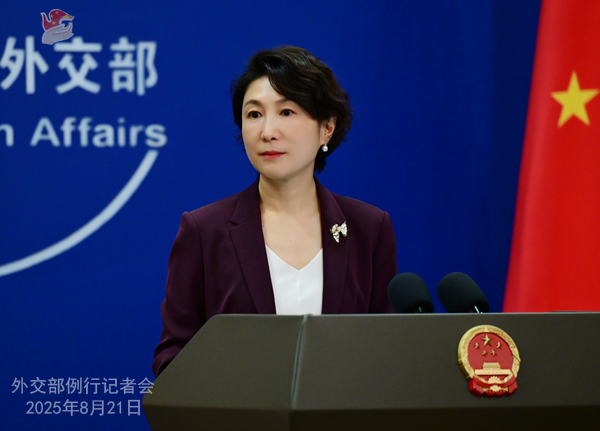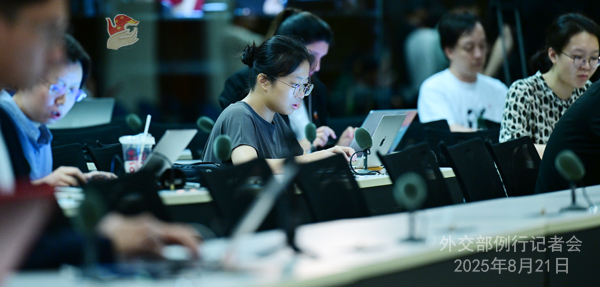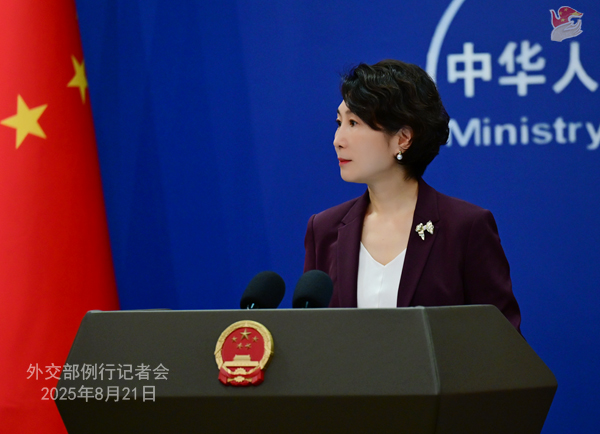
People’s Republic of China


Hubei Media Group: We noted that Foreign Minister Wang Yi concluded his visit to Afghanistan. Could you share more details with us?
Mao Ning: On August 20, Foreign Minister Wang Yi visited Afghanistan. He met with Afghan Prime Minister Mullah Mohammad Hassan Akhund and Interior Minister Sirajuddin Haqqani, had talks with Afghan Foreign Minister Amir Khan Muttaqi, and attended the sixth China-Afghanistan-Pakistan Foreign Ministers’ Dialogue.
Foreign Minister Wang Yi said that China advocates equality among all countries regardless of size and that all countries should treat each other as equals and work for mutually beneficial cooperation. The world should not make the rich richer and the poor poorer. All countries, including Afghanistan, have the right to thrive and prosper. China pursues a foreign policy of friendship towards all Afghan people. We respect the Afghan people’s choice and support the Afghan government in exercising prudent governance, focusing on development, firmly combating terrorism, and growing friendly ties with its neighbors to realize lasting peace and security.
Since the China-Afghanistan-Pakistan Foreign Ministers’ Dialogue resumed in 2022, the dialogue has produced positive results. Foreign Minister Wang Yi said that China stands ready to work with the other two countries to deepen good-neighborliness and mutual trust and understand and support each other on issues concerning each other’s core interests. The three sides need to have closer exchanges at various levels and consolidate strategic mutual trust. China supports Afghanistan and Pakistan in improving bilateral relations, deepening the integration of interests, properly handling differences through dialogue and consultation, and striving for steady and long-term trilateral cooperation. The three sides agree to make full use of the dialogue, strengthen exchanges and cooperation in various fields, and promote peace, stability, development and prosperity in the region.
Prensa Latina: U.S. warships are patrolling the Caribbean Sea near Venezuela’s coast and have warned they may use force on the excuse of fighting drugs. Presidents from Latin America and the Caribbean denounced these actions as a violation of regional peace and security. Would you share your opinion on this matter?
Mao Ning: China opposes any move that violates the purposes and principles of the UN Charter and a country’s sovereignty and security. We oppose the use or threat of force in international relations and the interference of external forces in Venezuela’s internal affairs under any pretext. We hope that the United States will do more things conducive to peace and security in Latin America and the Caribbean region.
Shenzhen TV: We noted that China recently released the economic data for July, in which foreign trade was a highlight, with import and export of goods hitting a new high this year. Comments say that the continued growth of China’s foreign trade speaks to the extensive global recognition of Chinese goods, and this will continue to drive the growth of China’s economy. However, other analysis shows that the tariff war and other external risks have dealt a blow to global trade and mounted pressure on China’s export market. What is your comment?
Mao Ning: Despite the complex and volatile external environment, China’s foreign trade has continued to perform well. That reflects the strong resilience of China’s economy and booming global demand for Chinese products. This is the combined result of China’s effort to expand high-standard opening up, promote high-quality development, and improve and upgrade industries.
Facts have proven that international trade based on comparative advantages enables common development and benefits all parties. China’s quality products are popular around the world and its diversified and stable market is favored by many. This is not something that could be changed by tariff or trade wars. China will continue to share its development opportunities with other countries through open cooperation for win-win results.

AFP: A new report by New Zealand’s security service has accused China of being the most active country engaged in foreign interference in New Zealand. Does the Foreign Ministry have a response to this report?
Mao Ning: In recent years, the New Zealand Security Intelligence Service has repeatedly spread disinformation, groundlessly framed and attacked China, smeared the normal friendly exchanges between various sectors of the two countries, and harassed and intimidated Chinese people in New Zealand, which shows relevant agency’s ideological bias and Cold War mentality. This does no good to mutual trust and runs counter to the two countries’ consensus of enhancing people-to-people and cultural exchanges. China deplores and opposes it. We urge relevant agency in New Zealand to stop spreading lies, stop creating misperception, and contribute more to people-to-people and cultural exchanges between the two countries and the sound and steady development of bilateral relations.
China Daily: Declassified documents released recently by the Russian government show that during World War II, Japanese invaders in China planned an attack on the Soviet Union from Northeast China, and prepared for a bacterial warfare able to cause mass casualties, and for this purpose established Unit 731 in Harbin. The unit conducted research on various types of plague, anthrax, cholera and other bacterial diseases. They also carried out human experimentation, and detained Chinese and Russian people as well as Japanese death-row prisoners for these purposes. What is China’s comment?
Mao Ning: During World War II, in blatant violation of international law, the Japanese army launched horrendous bacterial warfare against the Chinese people and conducted gruesome human experimentation, which were heinous crimes against humanity. The documents released by the Russian government show once again there are solid proofs of the bacterial warfare launched by Japanese militarists and there’s no room for denial.
To earn respect, one must first respect history. To open up the future, one must draw lessons from the past. To not repeat the wrong path, one must learn never to forget. This year marks the 80th anniversary of the victory of the Chinese People’s War of Resistance against Japanese Aggression and the World Anti-Fascist War. We urge Japan to reflect deeply on its history of aggression, respect the sentiments of the people of China and other victim nations, make a clean break with militarism, take concrete actions to get rid of the specter of militarism that still haunts it, and never let history repeat itself.
NHK: A question related to Afghanistan. Last month, Russia formally recognized Afghan interim government. Does China now recognize the Taliban’s interim government in Afghanistan?
Mao Ning: China is committed to a foreign policy of friendship towards all Afghan people. We stand ready to work with Afghanistan to promote bilateral relations.
CCTV: It’s reported that the readout released by China on Foreign Minister Wang Yi’s talks with Indian External Affairs Minister Subrahmanyam Jaishankar claimed that the Indian side said “Taiwan is part of China.” Indian government sources said that the external affairs minister had been misquoted. India stressed that there was no change in its position on Taiwan, and India had a relationship with Taiwan that focuses on economic, technological and cultural ties and that this would continue. What’s China’s comment?
Mao Ning: China has released readouts on the talks between the Chinese and Indian foreign ministers. For the Chinese side, the Indian side’s so-called “clarification” came as a surprise. We find it inconsistent with the facts. It would seem that some people in India have tried to undermine China’s sovereignty on the Taiwan question and impede the improvement of China-India relations. China expresses serious concern and firmly opposes that.
Let me stress that there is but one China in the world, and Taiwan is an inalienable part of China’s territory. This is a prevailing consensus among the international community, including India. We hope India will earnestly abide by the one-China principle, properly handle sensitive issues and promote the steady development of bilateral relations.




